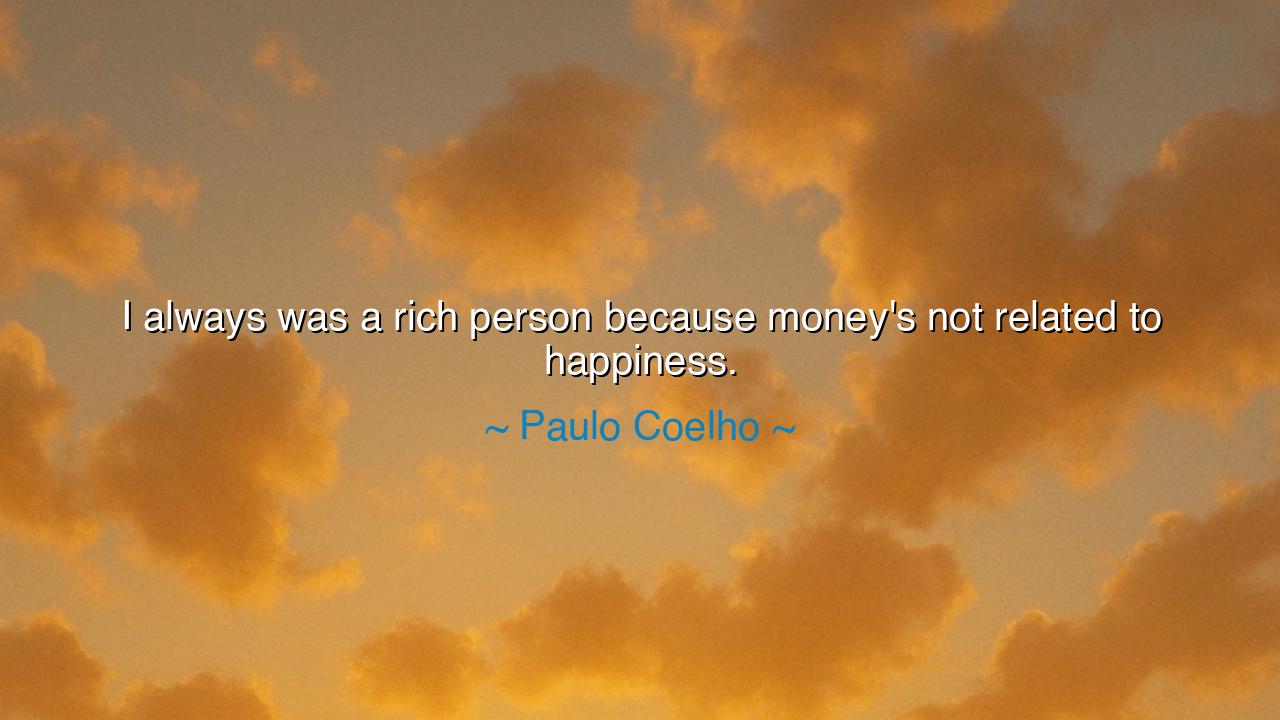
I always was a rich person because money's not related to






Paulo Coelho, the mystic wanderer of our age, once declared with disarming simplicity: “I always was a rich person because money’s not related to happiness.” In these few words lies a truth that the wise of every century have spoken, and yet the restless heart of man continues to forget. For Coelho does not speak of the wealth of gold or silver, but of the wealth of the soul — that inner abundance which no poverty can diminish and no fortune can increase. He reminds us that happiness is not a possession to be acquired, but a state of being to be awakened; not a treasure to be found in the world, but a flame already burning within the spirit.
The origin of this thought springs from Coelho’s own life, which wandered through hardship and revelation. Before his fame as an author of The Alchemist, he knew rejection, poverty, and even imprisonment. Yet amid such trials, he never lost sight of a deeper joy — the sense that life itself is sacred, and that meaning cannot be bought or sold. When he speaks of having “always been rich,” he is not boasting of material comfort but acknowledging an inner abundance, the gratitude and wonder that come from living fully awake to the miracle of existence. For one who walks in purpose and gratitude is richer than any king who walks in emptiness.
Through this truth, Coelho joins the company of the ancient sages. The Stoic philosopher Seneca wrote that “He is a poor man who counts his riches,” meaning that the measure of a man is not in his possessions but in his peace. Buddha, long before him, abandoned his palace not because he despised wealth, but because he saw its futility. Surrounded by luxury, he was yet empty; wandering in simplicity, he became whole. Likewise, Coelho’s words echo the eternal wisdom that joy is born not from having more, but from needing less.
Consider the life of Francesco d’Assisi, the saint who renounced all inheritance and walked barefoot among the poor. Many thought him mad, for he left behind gold for rags, a mansion for a hut, feasts for fasting. But in that poverty, he discovered a richness that transcended the world — the joy of belonging to everything, the peace of desiring nothing. When he sang to the sun and the birds, the earth itself seemed to answer him. He had lost all, and in losing all, he gained the kingdom of contentment. His happiness could not be stolen, for it was not built upon possessions, but upon freedom.
Money, Coelho teaches, is a useful servant but a cruel master. It can buy comfort but never peace, pleasure but never purpose. The man who measures his worth by what he owns will always feel poor, for the world will forever offer more to crave. Yet the one who awakens to gratitude — who sees beauty in a morning breeze, or joy in the laughter of a child — is already rich beyond measure. To say “I always was a rich person” is to say, “I have always had enough.” It is to see that the abundance of life cannot be counted in coins, but in moments of love, courage, and connection.
But such wisdom requires discipline of the heart. To live this truth, one must look beyond the illusions of comparison, for envy is the thief of joy. One must guard against the glittering lie that happiness lies just one purchase away. Instead, cultivate stillness and gratitude — notice the taste of food, the warmth of sunlight, the kindness of a friend. Wealth will then reveal itself not as something gained, but as something remembered. The richness Coelho speaks of is the remembrance of one’s divine inheritance: the capacity to love, to dream, to be.
So, my child of the restless age, take this lesson into your heart: you are already rich. Every breath you take, every act of kindness you give or receive, every sunrise that greets your eyes — these are treasures no empire can claim. Seek not to fill your pockets, but to fill your soul. Measure your life not by possessions, but by the depth of your gratitude. For when you awaken to the truth that happiness is not bought but lived, you will discover what Coelho himself knew: that the greatest wealth is to walk through the world with an open heart, content, fearless, and free.






AAdministratorAdministrator
Welcome, honored guests. Please leave a comment, we will respond soon